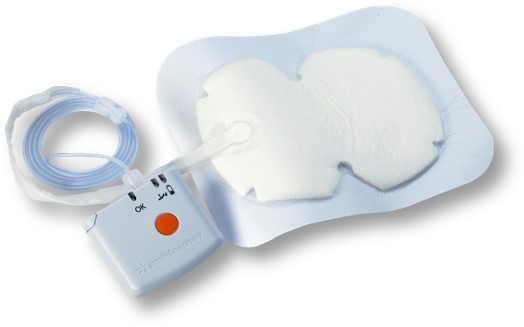
Simulation and performance testing of negative pressure wound therapy dressings

With a technical model of their wound therapy device performance, our client was able to demonstrate the high efficacy of their product range in the market.
42T developed physical and computational models of the tissue interaction of negative pressure wound therapy dressings, with the goal of reducing tension and fluid around a surgical incision.
The model uncovered deep insights into tissue behaviour and product performance. The resulting co-authored academic papers demonstrated market-leading performance to key opinion leaders.

What we did
Smith+Nephew’s PICO sNPWT dressing reduces the risk of post-operative complications by reducing fluid and tension around a closed surgical incision.
We worked with academics from the University of Cambridge to design a complex multi-layer silicone model that represented the properties of skin, fat and muscle tissue for mechanical testing.
We developed and validated a complex FEA computational model of a wound and dressing to benchmark performance and created a testing platform for future product developments..webp?width=730&height=960&name=shutterstock_2029274870%20(2).webp)
Result
We benchmarked the performance of the PICO dressing against a competitor and published an academic paper describing the results of our tests.
This allowed Smith+Nephew to demonstrate the high efficacy of their product range within the market.
Client perspective
Sarah Knight, Head of Healthcare Technology at 42T says: "42T’s FEA model, validated against physical testing, helped Smith+Nephew to make verifiable marketing claims that their device performed better than the competition."
"Our models and analysis demonstrated that the PICO device is able to reduce the lateral tension across a closed incision, which may explain observed clinical reductions in surgical site complications."
"We were very proud to collaborate with Smith+Nephew on the resulting scientific paper to disseminate our findings among the clinical community.".webp?width=725&height=553&name=Wound%20therapy%20pic%20(1).webp)
Reference: Loveluck J, Copeland T, Hill J, Hunt A, Martin R. Biomechanical Modelling of the Forces Applied to Closed Incisions During Single-Use Negative Pressure Wound Therapy. Eplasty. 2016 Jul 13;16:e20. PMID: 27555887; PMCID: PMC4979163.
We work with several clients in multi-disciplinary, international teams focused on medical innovation:
- Design for manufacture of high-precision parts
- Reworking existing designs for performance improvement
- Secondary sourcing for supply chain security
- Formative studies/user evaluations and human factors engineering
- Test protocols, verification, regulatory support
Find out more - contact our Director of Healthcare, Craig Townsend.
craig.townsend@42T.com | +44 (0)1480 309461 | LinkedIn: Craig
Related Articles

Healthcare & Life Sciences
Computational analysis of new product performance

Healthcare & Life Sciences
Technical due diligence on new injector for a high-profile drug product

Healthcare & Life Sciences
Small-batch RNA vaccine manufacturing system

What will you ask us today?
We believe in asking the right questions to drive innovation; when we know the right questions, we generate the ideas to answer them.

